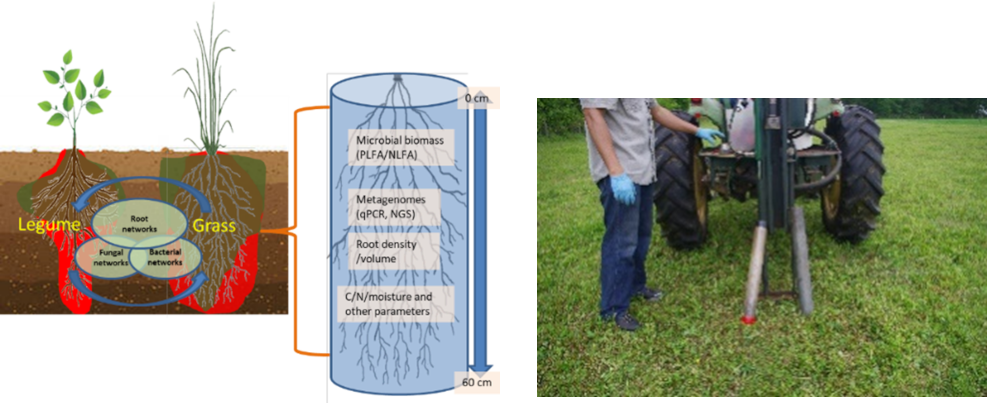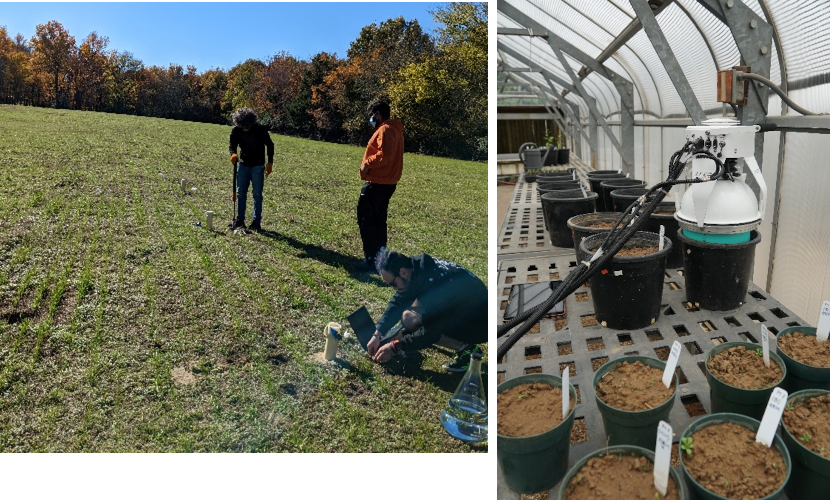Summary
The long-term goal of the soils research program is to enhance the sustainability of soil resources and their ecosystem services in agricultural lands and forests by understanding and applying practices that promote soil health, increase soil microbial diversity, enhance carbon sequestration, and mitigate greenhouse gas emissions. The program is also focused on developing innovative soil management technologies to improve soil properties such as disease suppression and bioremediation. The research program employs comprehensive soil analysis techniques, metagenomics, and modeling tools to characterize soil biogeochemical properties and their functional responses.
PI: Dr. Anil Somenahally, Associate Professor.
Email: anil.somenahally@ag.tamu.edu. Phone: 903-834-6191
Research publications in Google Scholar (click for list)
Team members: Saven Thai, PhD (Postdoc), Ross Thorn, MS (Research Assistant), Lauryn Coffman, MS (Research Associate), Chastity Aguilar, MS (Research Assistant), Prajina Neupane (MS student), Javad Robatjazi (PhD student), Thiruvikram Shanmuhasundaram, MS (Research Assistant)
Current research projects:
1. Building high quality carbon stocks and minimizing greenhouse gas emissions in East Texas grazing pastures and forests (Funded by USDA-Hatch, USDA-McIntire and USDA-Hatch Multistate)
Conducting research investigations at long-term grazing and forest sites in East Texas to understand the relationships among soil microbial diversity, soil aggregation, carbon sequestration, and greenhouse gas emissions in sandy-acidic soils. This work generates novel, actionable data for stakeholders in East Texas.
Articles:
- Assessing organic carbon sequestration in soil aggregates for building high quality carbon stocks in improved grazing lands
- Root-mycorrhizae interactions contributed to organic carbon density in the sandy soil profiles of adapted grazing lands
2. Apply soil health management to reduce disease pressure in organic vegetables
Several collaborative studies are in progress to evaluate and implement an integrated suite of soil health practices designed to suppress diseases in sandy, acidic soils. One project focuses on reducing the incidence of Burkholderia diseases in onions. (Collaborators: UGA and others, funding by USDA-NIFA). Another project focuses on reducing the incidence of Phytophthora diseases in peppers (Collaborators: NMSU and others, funding by USDA-SCRI). Another project focuses on reducing the incidence of human pathogens in manure amended soils (Collaborators: PVAMU and others, funding by USDA-NIFA).
3. Developing AI software tools for actionable soil health data (Collaborators: ASU and others, funding by SIF-PBC)
Current collaborative research focuses on developing soil health databases and a modeling framework that integrates AI tools to predict baseline soil organic and inorganic carbon stocks, and to generate actionable information for guiding land use practices.
Article:
4. Develop novel soil sensors to assess soil health parameters (Collaborators: UT Tyler, UT Dallas, funding by SIF-PBC and USDA-NIFA)
Collaborative research is validating innovative sensing technologies to measure a range of soil health properties. Another funded project is developing advanced sensors for precision nitrogen management in cotton plants.







